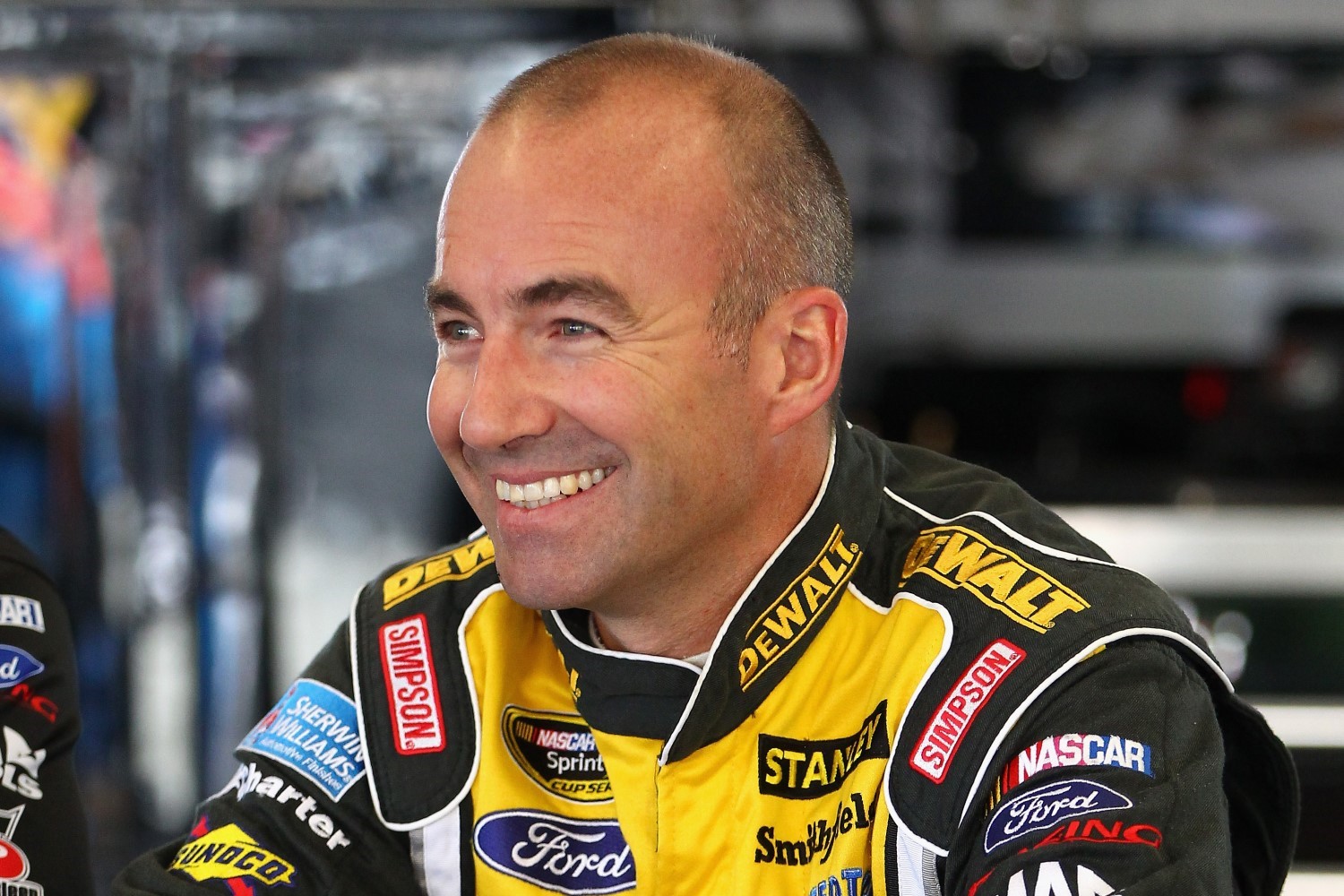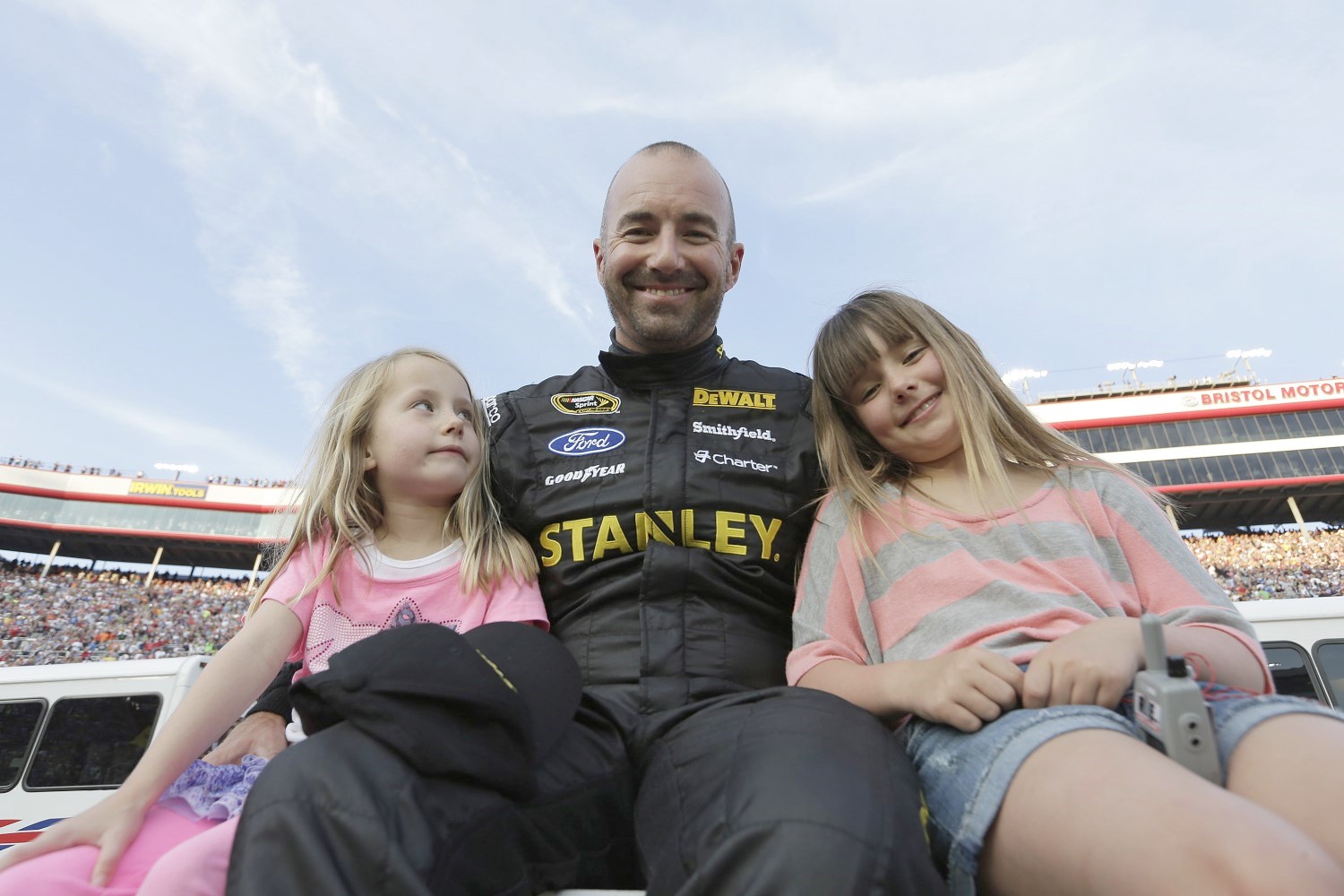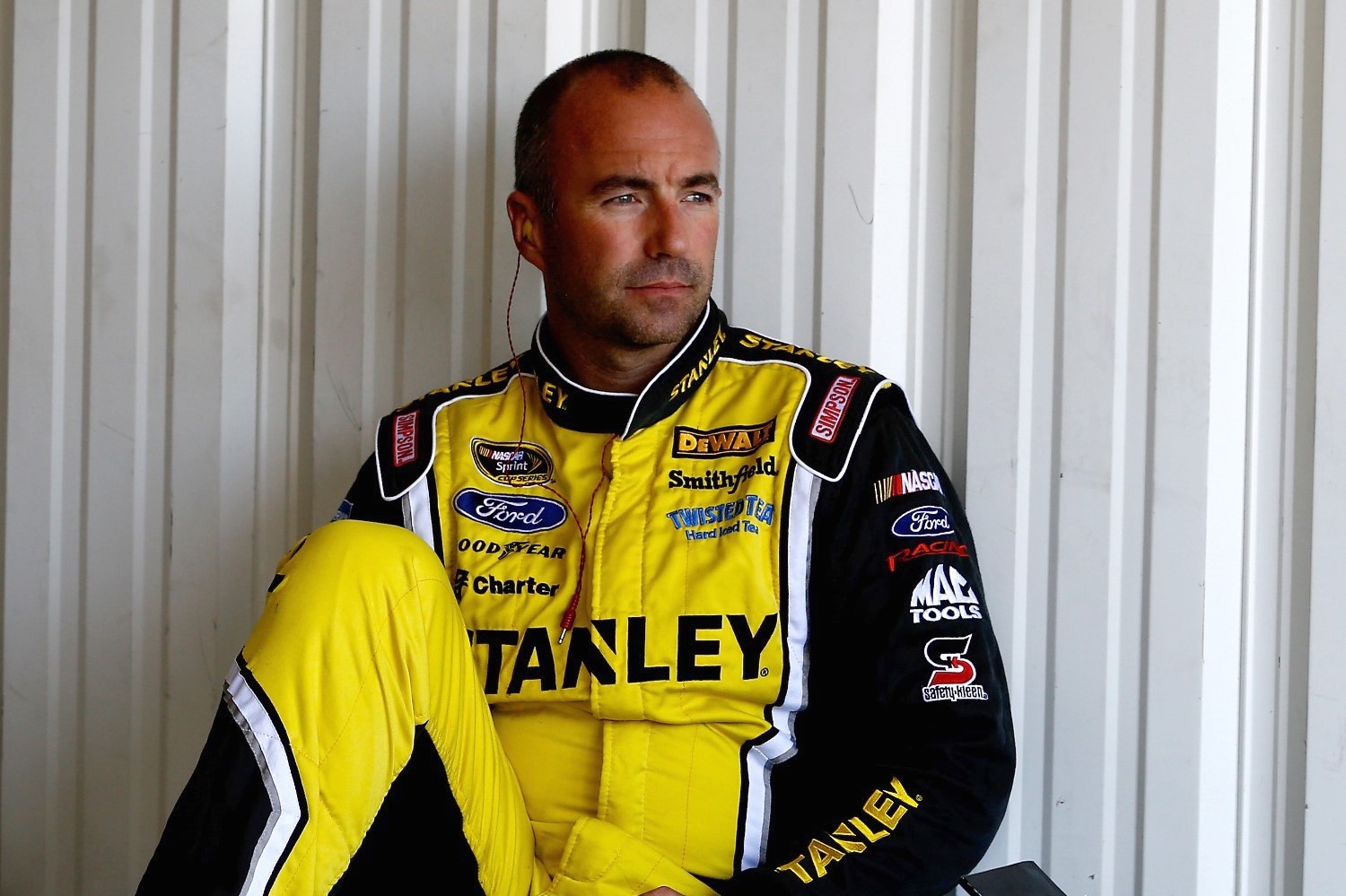The Unseen Finish Line: Marcos Ambrose’s Battle for Survival
Australia’s Marcos Ambrose (pictured at Pocono in 2014) has revealed his secret two-year fight with what doctors first diagnosed as terminal bowel cancer.
–by Mark Cipolloni–
The former V8 Supercars and NASCAR driver, 48, said his ordeal began unexpectedly while digging a trench in his Tasmanian backyard.
“I was digging a trench in my backyard, and I had a sore shoulder,” Ambrose said at the Marcos Ambrose at the 2025 Pirtek Legends Night.
“I thought, ‘It doesn’t quite feel right’, but I didn’t think much of it.”
Within 12 hours of visiting a doctor for what he assumed was a muscle strain, Ambrose was told he had stage four colorectal cancer. Doctors discovered the shoulder pain was referred pain from secondary cancer in his liver.
“They called it terminal at the time, and so we just went straight into panic mode,” Ambrose said.
In the rearview mirror of his storied career, Marcos Ambrose had always been the picture of grit—a Tasmanian farm boy who stormed into V8 Supercars in 2001, snagging Rookie of the Year honors before clinching back-to-back championships in 2003 and 2004. Across 147 starts, he racked up 28 wins, cementing his status as one of Ford’s most successful drivers Down Under.
Then came the bold leap across the Pacific: 227 NASCAR races, two Cup Series triumphs at Watkins Glen in 2011 and 2012—the first Australian to conquer the American ovals—and a $4 million contract he famously walked away from in 2014. “I want them to grow up as Australians,” he said at the time, eyes on his daughters, Tabitha and Adelaide, trading speed for family roots back home.

Retirement in 2015 ushered in quieter laps: coaching young guns, nurturing his Launceston property, and savoring fatherhood with wife Emma and their three children. At 46, he felt untouchable, the kind of bloke who could lap Father Time on a gravel rally stage.

But fate doesn’t play fair; it throws a red flag mid-corner. That afternoon in mid-2023, shovel biting into the earth, the shoulder twinge wasn’t a pulled muscle. It was a silent alarm from deep inside—a metastasis demanding reckoning. The GP’s ultrasound laid bare the horror: tumors choking his colon and liver, stage four, relentless, terminal. “Months, maybe a year,” the oncologist warned, the prognosis slamming like a wall at Bathurst’s Esses. Ambrose, the ultimate tactician, leaned in: “What’s the battle plan?” His racer’s brain fired up, already charting the chicanes ahead.
Panic mode engulfed them like a spin at The Chase. Emma’s grip tightened on the wheel as they motored home in shell-shocked quiet, the kids chattering innocently from the back. That evening, amid crumpled brochures and untouched plates, they sketched the opening stint: an immediate, all-out assault in Launceston with “heavy-duty chemotherapy.” For 12 brutal months, Ambrose pushed through cycles that hollowed him out, nausea crashing like G-forces, his ironclad build wasting away.
“I did 12 months of heavy-duty chemo, as much as I could handle,” he said. “It went longer and deeper than I ever thought I could go.”
Miraculously, the poison outpaced expectations, stalling the cancer’s march and cracking open a surgical window. A colectomy carved out the primary tumor, but the liver—riddled beyond repair—loomed as the real roadblock. Standard resection? Off the table. Full transplant? The lone lifeline, gated by a trial program for cases like his.
“Then if I got through that, I went back on the chemo again and it opened this window for a trial organ transplant for people like me,” he said.
Eligibility was a gauntlet: youth, stellar chemo response, no rogue spread. Green-lit for Sydney’s Royal Prince Alfred Hospital list, Ambrose relocated temporarily, hovering within an hour’s dash for two agonizing months—phone glued to his side, every buzz a potential lifeline.
“They called about 4pm and said, ‘We think we’ve got one,'” he recalled. “Then they rang and said ‘No, we want you to come in by 8pm’. So I had about four hours notice.”
The op was a high-stakes gamble—experimental, high-risk, just the third of its kind in Australia. As surgeons sliced in for the 12-hour siege, Ambrose surrendered to the OR’s cold symphony, a universe away from V8 thunder. “My life was saved by the grace of somebody else,” he said, the donor’s shadow a profound, unnamed hero.
Success: 14 days in the ICU, home within a month, tubes swapped for tentative strides. The Ambrose crew never faltered. Emma, his unflinching navigator, logged every symptom, fierce in consults where despair hung heavy. The kids’ crayon masterpieces—Dad as a caped speedster with turbo heart—fueled the fire. Mates from the grid rallied: Jamie Whincup with nutrient bombs; Tony Stewart’s gravelly voicemails, “You smoked me at the Glen—smoke this too.” Ambrose zipped it from the spotlight—pure racer’s code. “Play your hand tight,” he shrugged. “No sympathy laps. I finish my way.”
Now, one year post-transplant in October 2025, Ambrose has uprooted to Melbourne for the long haul, anchoring regular scans and tweaks at Austin Hospital. Scans shine clear: remission holds, the monster muzzled. He’s ditched the colostomy, reclaimed unassisted miles on foot. “You could sit here one-year post the risky, major operation and a diagnosis of a terrible cancer and to be here where we are today, it’s just a miracle,” he said. “I’m still recovering. It’s going to be a while, but … I bounced really well.”
Yet the checkered flag waves distant. “It doesn’t stop from the operation; you’ve got to keep managing your body. I’m on a lifelong program now,” he cautioned. Three years out, the true verdict looms—vigilance his new co-driver, every cough or ache a shadow to chase. At 48, he re-enters the fray, not strapped in but standing tall: a beacon for the blindside blitz of illness. He’d skipped bowel screens—too young at 46, guidelines kicking in at 50. “I had no idea,” he confessed, the gap a gut punch.
His clarion call rings urgent: “Go get checked. It’s not even about the bowel cancer check, just go see your doctor, check everything.” And atop it all, a fierce hymn to organ donation. “If there’s one thing you can do, it’s donations,” he implored. “That was the bit that I really want to express—donating, ticking the box, donating life—it has probably saved my life.”
Tasmania’s trailblazer, who blurred man and machine across continents, now races the human circuit: grooming the next grid generation, championing early alerts and donor drives, proving the fiercest duels unfold far from the asphalt. In Melbourne’s hush, trench dust long settled, he unearths meaning—not soil, but legacy.
As twilight cloaks the Yarra, Ambrose idles a phantom throttle. “Life’s not the quickest lap,” he reflects. “It’s the strong finish.” And that line? He’s redlining toward it—one resilient pulse at a time.
